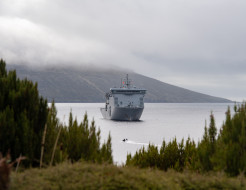
HMNZS Canterbury to provide platform for NZ work in Sub-Antarctic islands
03 March 2025
Unfortunately you are viewing this website on an outdated browser which does not support the necessary features for us to provide an adequate experience. Please switch to a modern browser such as latest version of Google Chrome, Mozilla Firefox, Apple Safari or Microsoft Edge.
Ngā mihi nui
Our size, skills, equipment and training are geared for combat. But when you’re as large as the Navy, with highly skilled personnel and specialised assets, you end up being very valuable in a wide variety of other situations.
The Navy has over 2,500 personnel. It has disciplined forces and a fleet of ships and aircraft. In maritime terms, these resources are on a scale that civilian authorities can’t match, and the best thing about us, is that we're available at short notice when a crisis happens. It could be in New Zealand, or it could be for our Pacific neighbours.
Government agencies, such as the National Maritime Coordination Centre or National Emergency Management Agency, will look at a situation, like a mayday, a flood, or a fire and ask themselves: what is the best way to solve this situation? When it’s on a large scale, or if it is remote and inaccessible, the Navy has the skills and equipment to support the response.
A good example is search and rescue operations. The Royal New Zealand Navy rotates vessels to be on short notice to depart if a mayday call is received from a vessel at sea, especially if people need medical aid.
Our personnel rescue people, survey damage and deliver Government assessment teams into affected areas. For instance, following an earthquake in 2016, the Navy evacuated hundreds of tourists and New Zealanders from Kaikōura.
But community support isn't just about emergencies – it’s about being a good community partner. The Navy have supplied remote islands like Tokelau with vital infrastructure for power generation and water storage.
We help to ensure our fighting heritage – and the men and women who served during the two World Wars and other conflicts - are not forgotten. Our veterans and what they have done for New Zealand is important to the New Zealand Defence Force. The Navy supports the Returned and Services’ Association with commemorative events in New Zealand, as well as major commemorations overseas, such as Gallipoli.
The Navy also works to support New Zealand’s youth because we are a progressive employer and keen to showcase what the Navy can offer. The market for skilled youth is competitive, and we’d like New Zealand’s youngsters to see the Navy as a promising and fulfilling career. The Navy and the Air Force run introduction programmes for Year-13 girls who favour Science, Technology, Engineering and Mathematics. The Navy helps programmes such as the Sea Cadets within the New Zealand Cadet Forces. These programmes, which include motivational training and valuable life skills, make a difference in the lives of youth and in their communities.
The Navy is a major New Zealand employer. That means we provide New Zealanders with satisfying careers that supports not only themselves but the communities they live in. Devonport Naval Base has hundreds of personnel living and working on base, and this boosts local economies.
These area some of our stories
Our other areas of work